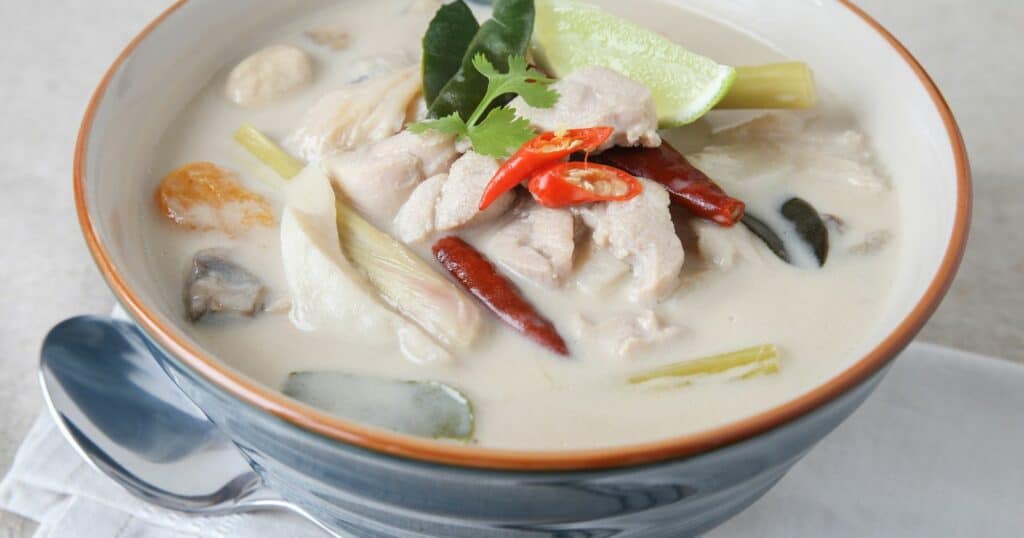Eating Thai food during pregnancy can seem questionable at times. The bold, spicy flavors may make some pregnant women hesitate. However, the good news is that most Thai dishes are perfectly safe to eat when you’re expecting.
In this article, we’ll cover everything you need to know about eating Thai cuisine during pregnancy. We’ll look at:
- The importance of a balanced diet when pregnant
- Which Thai dishes are safe
- What to limit or avoid
- How to choose Thai restaurants wisely
- And some delicious pregnancy-safe Thai recipes to try
So read on to get the full scoop on savoring Thai food when you’ve got a bun in the oven!
Why a Balanced Diet Matters During Pregnancy
Eating a nutritious, balanced diet is crucial when you’re pregnant. Your body needs extra nutrients to nourish both you and your growing baby.
Here are three key reasons why your diet matters so much when expecting:
1. Getting Enough Key Nutrients
Pregnancy ramps up your needs for certain vitamins and minerals like folic acid, calcium, iron, and choline. Eating a variety of nourishing foods makes it easier to get enough of these essentials for you and baby.
2. Promoting a Healthy Pregnancy Weight Gain
Gaining a healthy amount of weight supports your baby’s growth and development. Choosing nutritious foods that are low in empty calories makes it easier to gain weight at the right pace.
3. Staying Properly Hydrated
Drinking enough fluids prevents dehydration and helps your body function optimally. Water, milk, juices, and soups all count towards your daily fluid goals.
So focus on getting plenty of fruits, veggies, whole grains, lean protein, dairy, and healthy fats from across the food groups. This provides the best nutritional foundation.
Are Fully Cooked Thai Dishes Generally Safe?
The good news is that enjoying Thai food is perfectly fine when cooked properly. Fully cooked Thai dishes are typically safe to eat during pregnancy.
Here’s why:
- Thorough cooking kills bacteria. Foodborne illnesses are less likely when dishes are cooked thoroughly.
- Many ingredients get cooked or fried. Raw garlic, shallots, chilies, and herbs often get sautéed or fried during cooking. This reduces risks.
- Reputable restaurants follow food safety. Choosing restaurants carefully means kitchens adhere to hygiene best practices.
So you can feel good about eating fully cooked Thai curries, noodles, stir fries, and other favorites. Just take the same basic precautions as with any cuisine.
What Thai Foods Should You Limit or Avoid?
While most Thai food is a-ok during pregnancy, there are couple types of dishes and ingredients to be mindful of. Here’s a quick overview:
Limit Fried and Deep Fried Dishes
It’s smart to limit how often you indulge in fried goodies like spring rolls, fried shrimp, or pad thai. The high fat and calorie counts make it easy to overdo it. Enjoy in moderation along with more nutritious choices.
Avoid Raw and Undercooked Seafood
Raw or undercooked fish and shellfish are a no-go during pregnancy. Parasites like Toxoplasma can contaminate these foods and cause foodborne illnesses. Play it safe by avoiding popular Thai dishes like larb (minced meat salad), nam tok (spicy raw beef or pork), and other uncooked seafood.
Skip Unpasteurized Items
Unpasteurized foods like unpasteurized soft cheeses, juice, milk, and cider are risky since they may contain harmful bacteria like Listeria or Salmonella. Luckily these are uncommon in Thai cuisine, but good to keep in mind.
Watch Out For Food Allergies
If you have food allergies, carefully avoid any problem ingredients. Common allergens in Thai food include peanuts, soy, shellfish, fish, and MSG. Inform staff about any allergies when dining out so they can accommodate you.
Beyond these simple precautions, you can fill your plate with an abundance of delicious Thai foods during pregnancy.
Choosing Thai Restaurants Wisely
When eating Thai food at a restaurant, take a few easy steps to minimize risks:
- Opt for well-established restaurants with a reputation for following safe food handling practices. Avoid questionable hole-in-the-wall spots.
- Check inspection scores, if posted. High scores indicate proper sanitation and storage procedures.
- Order fully cooked entrees, avoiding any raw or undercooked ingredients. This limits bacteria exposure.
- Request modifications to omit any problem ingredients, like swapping tofu for meat in pad thai. Most restaurants will happily accommodate dietary needs.
- Avoid buffets as food sits out for extended periods, upping contamination risks. Opt for made-to-order dishes instead.
Being selective about where you eat Thai food out makes it easy to continue enjoying this vibrant cuisine during pregnancy.
Getting Personalized Advice From Your Healthcare Provider
Your doctor or midwife can offer tailored guidance on what Thai foods to embrace or limit during pregnancy. Here are some tips for getting the most from your prenatal care:
- Discuss any food concerns or questions you have about eating Thai cuisine or other ethnic foods. Don’t be afraid to speak up!
- Share your complete health history, including any food allergies. This helps your provider give appropriate recommendations.
- Ask about vitamins or supplements that can fill any nutrition gaps, like folic acid, iron, or omega-3s.
- Request a referral to a registered dietitian if you need help creating a personalized healthy pregnancy eating plan.
With an open dialogue and personalized advice, you can craft a Thai-inspired diet that optimizes your and baby’s health.
The Scoop on Common Thai Ingredients

Many flavorful herbs, spices, and ingredients give Thai food its distinctive taste. Here’s a quick guide to pregnancy-safe options:
- Lemongrass – Adds citrusy flavor. Safe when cooked.
- Ginger – Provides zing and aids digestion. A healthy addition.
- Galangal – A relative of ginger, also safe when cooked.
- Coconut milk – Gives a creamy richness and healthy fats. Enjoy in curries.
- Chilies – Lend heat and
spice . Go milder if heartburn is an issue. - Cilantro – Fresh, tangy flavor. A great low-calorie seasoning.
- Lime – Brightens dishes. Watch acidity if you have reflux.
Many quintessential Thai ingredients can healthfully enhance flavors during pregnancy when consumed cooked and in moderation. Consult your doctor about any concerns over specific seasonings or foods.
With so many tasty Thai herbs and spices to explore, you can continue to enjoy the complex flavors you love when expecting.
Satisfying Pregnancy-Safe Thai Recipes to Try
Craving classic Thai flavors? Whip up these nourishing recipes that are tasty and pregnancy-friendly:
Thai Coconut Soup (Tom Kha Gai)

This iconic soup features chicken simmered in a creamy, comforting coconut milk broth infused with ginger, lemongrass, chilies, and lime. It’s protein-packed yet light.
Pad Thai with Tofu

Skip the raw egg and opt for pan-fried tofu in this take on the classic noodle dish. Rice noodles, bean sprouts, peanuts, and lime give it that tangy Thai flair.
Thai Vegetable Curry
Lean into veggies like eggplant, peppers, carrots, and green beans simmered in a flavorful curry coconut sauce. Serve over brown rice for a balanced meal.
Fresh Spring Rolls with Peanut Sauce
Rice noodles, lettuce, carrots, mint, and shrimp get wrapped up and dipped in a sweet peanut sauce. A light and refreshing option.
Thai Pork Stir Fry
Lean pork tenderloin provides the protein while broccoli, snow peas, peppers, and mushrooms add vitamins, minerals, and fiber. Quick to whip up for busy nights.
So dig into all kinds of bold, delicious Thai dishes during pregnancy! Just take a few minor precautions and get advice from your healthcare provider. With so many nourishing pregnancy-safe options, you can continue to enjoy this tasty cuisine.





